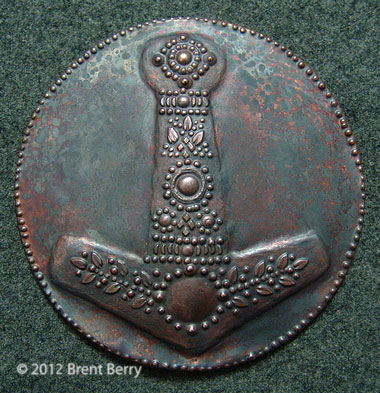Brent Berry Arts
Repoussé
HOW IT'S DONE - IN THICKER METAL - 22 gauge to 14 gauge Thick
3 different examples of Copper repousse using pitch.
Repoussé Pitch has been made from many different mixtures since ancient times. When it's hot, it's soft like putty, you place the front side of the metal into the hot pitch, which is usually in a strong container or cast-iron bowl. As the pitch cools, it becomes hard but still malleable and soft enough to allow the metal to be formed into it when it is struck with a hammer or a tool. The design is then embossed by hammering shapes into the back side of the metal. When the embossing is done, the pitch is removed by heating it again. The front side is cleaned and then additional tool work and engraving can be done to the design. Some pieces require repeatedly working the metal from both sides in pitch.
These are only simple designs but they show the basic steps of repoussé work.
Practicing metal embossing with a simple Norse knotwork symbol
|
|
 Sketch design
  After heat, acid, and oxidization with chemical bluing
|
 Using tools with copper in the pitch
 Front side after embossing
 Slightly cleaned to achieve an ancient looking patina
|
Thor's Hammer, variation 1
|
|
 Working the backside
|
 Ready to work the front side
|
 |
 Working the backside again
|
 Adding texture to the background with a hammer only
|
 Embossing finished
|
 Scrubbing the surface with volcanic pumice pumice and water
|
 After heating once more to get a uniform surface
|
 Clean surface after scrubbing and acid treatment
|
 Using chemical bluing and water to tarnish the surface
|
 After tarnishing
|
 Lightly polished in order to get a nice patina
|
Thor's Hammer, variation 2
|
|
 First strokes
 Adding shapes using metal tools, stamps, punches
 Backside after embossing work
|
 Smoothing surfaces of the work area
 Adding more shapes to the design
 Front side after embossing work
|
 Thor's Hammer Copper Disc after heat, acid and tarnishing treatment
|
|
